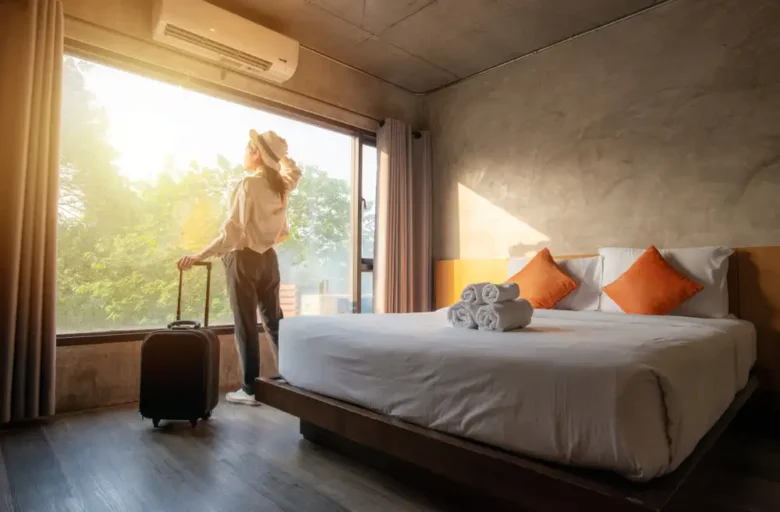Staying in a hotel is a pleasure, but safety is always a top priority. Whether you’re traveling for business or pleasure, there are a few extra steps you can take to improve the security of your hotel room. From preventing unexpected intruders to protecting your belongings, a few small changes can go a long way in reducing risk. Being proactive can give you peace of mind, but many travelers ignore basic safety precautions because they assume hotels are always safe. Whether you’re staying at a luxury resort or on a budget, here are six smart tips to create a safer environment in no time. Let’s take a look at a few simple ways to make your hotel stay safer.
Check Your Room Upon Arrival:
Before you check in, take a few minutes to thoroughly inspect your hotel room. Check that the door and window locks are working properly. Check for signs of tampering, such as a broken lock or loose screws in the frame. Look through the peephole to make sure you have a clear view of the hallway. If something seems off, ask for a different room immediately. Locate emergency exits and familiarize yourself with evacuation routes. A quick assessment can help you spot potential security holes before they become a problem.
Use Security Chains and Door Locks:
While most hotel doors come with security chains and door locks, many guests do not use them. Make sure to activate both devices, even if you are only leaving your room for a short time. Security chains prevent someone with a key from fully opening the door, while door locks provide additional protection against break-ins. A good option is to carry a portable doorstop alarm that can be clipped under the door and will sound the alarm if someone tries to enter. These small steps will make it harder for intruders to enter your room.
Hide Valuables:
It is very dangerous to leave valuables such as cash, jewelry, or laptops out in the open. It is best to store them in your room safe or in another hidden place, such as your luggage. If the safe seems unreliable, use a hidden travel bag or take valuables with you. Important documents, such as passports, should never be left unattended, as housekeeping staff or hotel employees are not always trustworthy. Even if you trust the hotel, prevention is better than a cure. Hiding valuables can significantly reduce the risk of theft.
Don’t Make Your Room Number Public:
When checking in, think about who might hear your room number. Politely ask to change rooms, or ask the front desk clerk to write it down if he or she already has it. Making your room number public makes you an attractive target in a lobby full of strangers. Also, wait until after you check out to share your current location on social media. The fewer strangers who know your location, the safer you are.
Smart Use of “Do Not Disturb” Signs:
A “Do Not Disturb” sign on your door can deter potential thieves, even when you’re not home. By giving the impression that the room is occupied, you reduce the chance of uninvited guests entering. If you don’t need daily housekeeping, this can also limit the number of people who can enter your space. For longer stays, you can request periodic trash pickup or towel changes without having to open the entire space. This simple method provides privacy and keeps unwanted guests out.
Be Careful When Someone Knocks on Your Door:
Always check to see if the person knocking is a hotel employee before opening the door. Call the front desk to check if room service or maintenance is scheduled. Sometimes scammers will pose as hotel employees to get into your room. Follow your instincts until you are sure you are inside, and refuse entry if you notice anything unusual. Never let anyone in, even if they seem formal or friendly. A quick phone call to the front desk can help prevent potential threats or scams.
Conclusion:
While hotel security is often overlooked, a few simple steps can significantly improve your personal and financial safety. Here are six practical tips to make your stay safer, from locking your door to hiding your valuables. Always check your room upon arrival, don’t give your room number to strangers, and be wary of unexpected guests. Follow the steps below, and you can enjoy your trip worry-free. Make the most of your trip, be smart, and stay safe. A little attention can go a long way.
FAQs:
1. Should I leave my valuables in the hotel safe?
While most hotel safes are guarded, some can be easily opened with a master key. If you are unsure, use a portable travel safe or bring your valuables with you.
2. What should I do if the hotel room door is not locked properly?
Alert the front desk immediately and ask to change rooms. A broken lock poses a serious security risk.
3. Is it safe to leave your belongings in the room while you are away?
They are only safe if they are hidden or safely stored in a safe. Do not leave electronic devices, cash, or passports outside.
4. How can I assess the overall security of a hotel before booking?
Check the security of the area, read recent reviews, and check for security features such as cameras and 24-hour staff.
5. What should I do if there is an unexpected knock on the door?
Always contact the front desk before opening the door. Be careful if someone pretends to be an employee when you have not requested any service at all.




